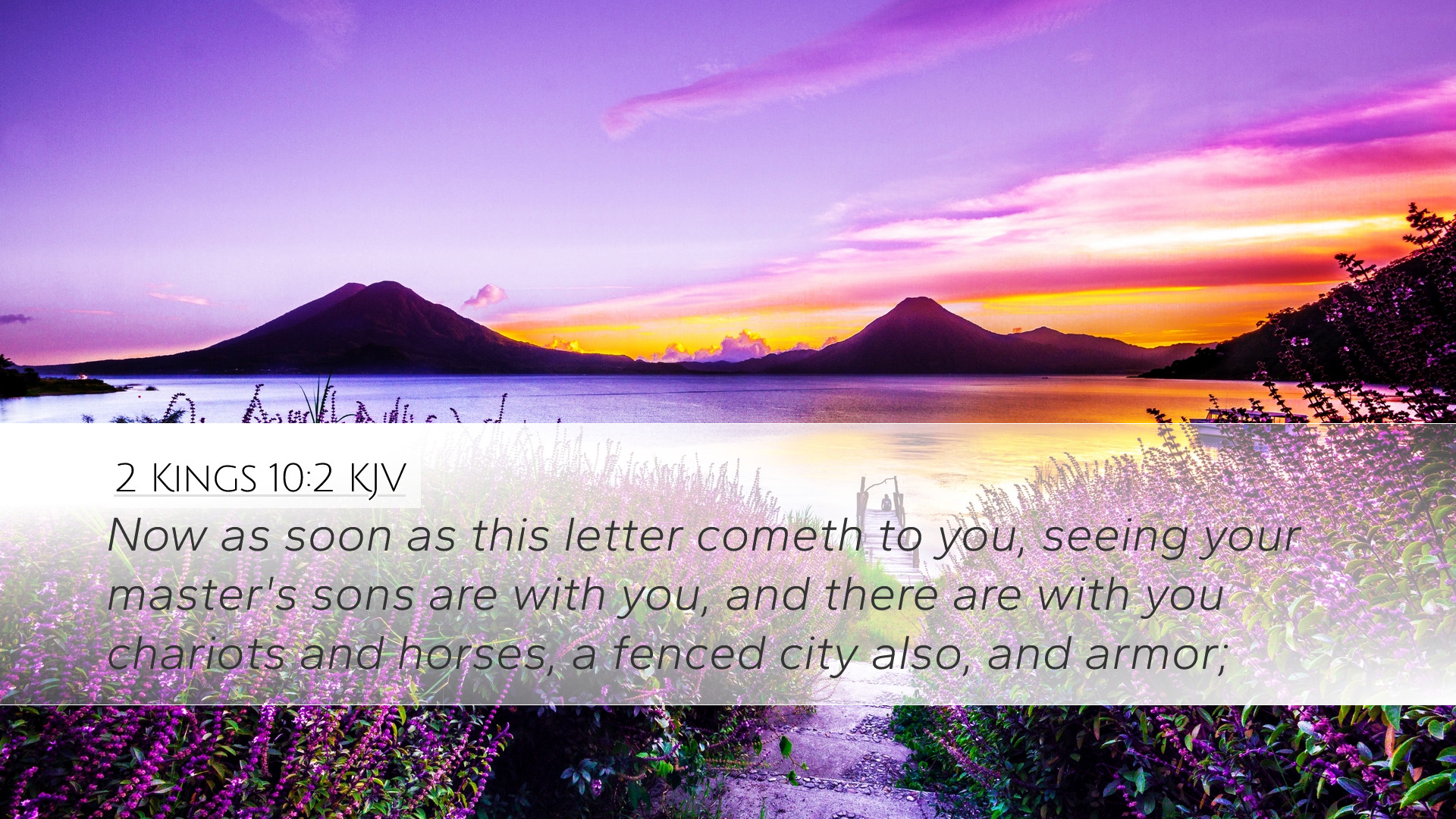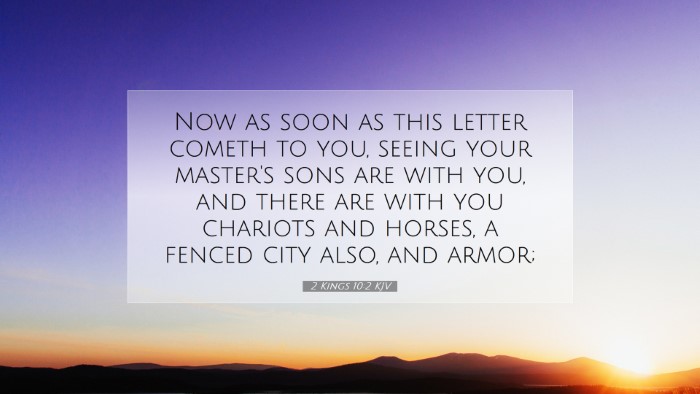Commentary on 2 Kings 10:2
Verse: "And now, as soon as this letter comes to you, seeing that your masters' sons are with you, and the chariots and horses, and fortified cities also, and the weapons, choose the best and fittest of your master's sons, and set him on his father's throne, and fight for your master's house."
Introduction
This verse forms a crucial moment in the narrative of the transition of power during the reign of Jehu in Israel. As we delve into the historical context and theological implications of this verse, insights from respected public domain commentators such as Matthew Henry, Albert Barnes, and Adam Clarke will shed light on its significance for pastors, students, theologians, and Bible scholars.
Contextual Background
The events leading up to 2 Kings 10:2 are marked by turmoil and transition in Israel's monarchy. Following God's judgment on Ahab’s house due to their idolatry and sins, Jehu was anointed king, tasked with the divine mission to eradicate the worship of Baal. This verse, therefore, occurs at a pivotal moment where Jehu sends a letter to the leaders in Samaria, urging them to choose a successor to Ahab and prepare for conflict.
Exegesis and Insights
The Leadership Challenge
Henry emphasizes the gravity of the leadership challenge posed in this text. Jehu’s directive serves as a test of loyalty and resolve among those in power. He writes, "Jehu's challenge to the leaders serves to remind them of their duty to uphold God’s will against corruption." The question posed—who will lead?—is not merely political but spiritual, reflecting the constant choice between faithfulness to God and compliance with evil.
The Call to Arms
Barnes highlights the military and political undertones in Jehu’s message. He states, "Jehu’s instruction to arm and fortify reveals the urgency of dismantling Ahab's legacy of idolatry and sin. It was not enough to change leadership; the new king had to decisively act against the remnants of Baal worship." The imagery of chariots and weapons underscores the impending conflict and the seriousness with which Jehu approached his self-appointed mission.
The Role of the Assassins
Clarke provides a fascinating observation about the nature of leadership and justice within this narrative. He posits, "The act of choosing a successor becomes an act of resistance. True leadership emerges not out of despotism but from the willingness to confront evil directly." The act of choosing whom to fight for shapes the moral landscape, suggesting that leadership must be active and dynamic in the face of oppression.
Theological Implications
God’s Sovereignty and Justice
This verse illustrates the overarching theme of divine sovereignty in the context of human affairs. Henry remarks on how God utilizes human decisions to fulfill His purposes, stating, "Though men make choices, God is sovereignly orchestrating history toward His ends." This reminds the faithful that divine judgment is often executed through human action guided by divine will.
The Importance of Righteous Leadership
Barnes reflects on the necessity of righteous leadership in society. He observes, "When leaders emerge from corrupt lines, it is the responsibility of the faithful to discern and actively support those who would promote godliness and justice." This presents a challenge to modern leaders in their pursuit of righteousness amid a corrupt cultural backdrop.
Discerning God’s Will
According to Clarke, Jehu's call exemplifies the need for discernment in choosing leaders who will champion God's purposes. He encourages readers to consider, "How do we identify leaders who align with God’s will? This serves as a call to prayerful consideration and active participation in governance and societal leadership."
Practical Applications
-
Encouragement for Pastors:
Pastors must encourage their congregations to discern godly leadership in various spheres and remind them that every leader’s heart is reflected in their actions.
-
Guidance for Theologians:
Theologians can take this scripture as a study of the intersection of divine purpose and human action in leadership contexts.
-
Challenge for Students:
Students, especially those studying theology and religious studies, should reflect on the implications of choosing leaders and their moral responsibilities in the modern world.
Conclusion
In summarizing this commentary on 2 Kings 10:2, we recognize that this passage invites us to reflect critically on leadership, responsibility, and the importance of aligning with God’s purpose. As Jehu's era demonstrates, prominent moments call for decisive action founded on righteousness. This verse transcends its historical context, speaking powerfully into our contemporary leadership challenges, serving as a reminder that faithfulness to God must guide our choices in both private and public life.


